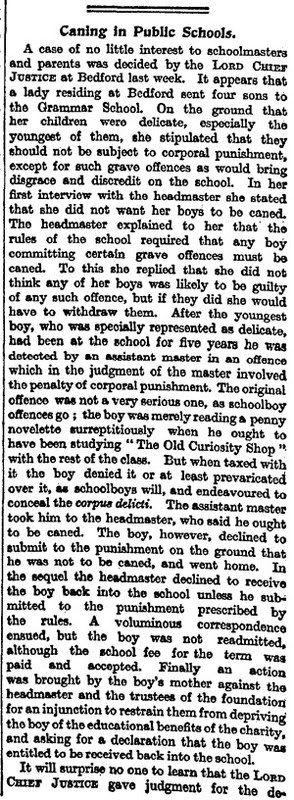British Medical Journal, London, 5 January 1935, p.38
Correspondence
Corporal Punishment for Girls
I feel very strongly that Dr. Kitching did not go far enough, and that the time has come when caning or birching of any child under sixteen years, whether by policemen, school teachers, or parents, should be illegal. Our sailors and soldiers, even our criminals, are now protected by law, except in the case of gross offences. Only children are, in this matter, “nobody’s child,” and are the victims of a form of “correction” which is a relic of barbarism.SIR,– Dr. R. L. Kitching deserves our thanks for his exposure of a grave social blot: it seems incredible that the Board of Education should be apparently content with its present attitude towards the corporal punishment of female children. I like to think that Dr. Kitching’s letter will be read in a hundred years’ time, or less, as we now read accounts of the hanging of children for larceny, and I am glad to be able to inform you that the Belfast Education Committee and its Director of Education are discouraging the casual use of the cane in all elementary schools. From my personal experience I can state that even a very large mixed school of over one thousand pupils, whose ages vary from six to nineteen years, can be conducted with perfect discipline and without any form of corporal punishment. — I am, etc., ROBERT MARSHALL. Belfast, Dec. 23rd, 1934. __________________ SIR, — The letter of Dr. R. L. Kitching on the caning of girls in public elementary schools deserves more attention than the Board of Education seems inclined to give it. A few weeks ago in a talk on epilepsy which I gave to the teachers in the Plymouth Council schools, I stated that I considered the caning of girls was wrong and ought to be stopped by the Board of Education, and I quoted a case which recently came to my notice, where a girl who was certainly threatened with epilepsy, if not a definite epileptic, had been caned because she was late for school. Believing as I do that the starting-point of epilepsy is so largely psychogenic, it seems to me obvious that caning must often convert the ordinary nervous child into an epileptic, with very dire consequences for the unfortunate child. Caning from the teacher’s point of view is a very facile remedy, whilst the dangers which might be consequent upon it have never been pointed out to these teachers. Surely this ought to have been done, and surely it ought to be within the competence of the Board to find a less dangerous remedy. I do not suppose that my experience has been unique, and now that child guidance clinics are so numerous, I would suggest to the Board that if it wishes to arrive at the truth it should make inquiries from them. Quite apart from the reasons mentioned by Dr. Kitching, with which, I am sure, any person with experience of girls must agree, I sincerely hope that the Board will prohibit the caning of girls entirely, and will relegate the custom into the same category as shutting children up in dark cupboards. If the Board does see its way to stop the use of the cane I hope it will appreciate the fact that the use of a ruler for a similar purpose should also be included. -I am, etc., E. L. Fox, M.D. Plymouth, Dec. 28th. 1934.

